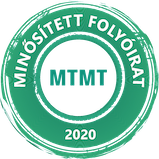Személynévadás és névhasználat a kései ómagyar korban
Habilitációs értekezés összefoglalója
Absztrakt
Personal name giving practices and name use in the Late Old Hungarian Period (1350–1526). Summary of a habilitation dissertation
The habilitation dissertation presents the stock and use of personal names in medieval Hungary, alongside the conventions of using personal names in written deeds, based on a corpus collected from 14th–16th-century Latin, German and Czech charters written in Hungary. With respect to single-constituent names, the author discusses the changes in their distribution over time by origin; explores the distribution of the spoken name variants appearing in the charters according to social class and gender, and demonstrates the changes in their proportion over time. In connection with the development of family names, the author examines the types of structures identifying persons, their frequencies, social distribution and their tendency to change over time. How personal names were inserted into the texts of the charters is analysed from the point of view of translation studies, and this survey shows that the structures found in the German and Czech documents were closer to the names used in spoken language than the ones appearing in Latin deeds. The reason for this lies in the fact that the two living languages held less prestige than Latin, and their use in writing must have been restricted in society and limited in time. Owing to polyglot contemporary scribes, charters also present an opportunity to discover language contact features in the use of personal names.




